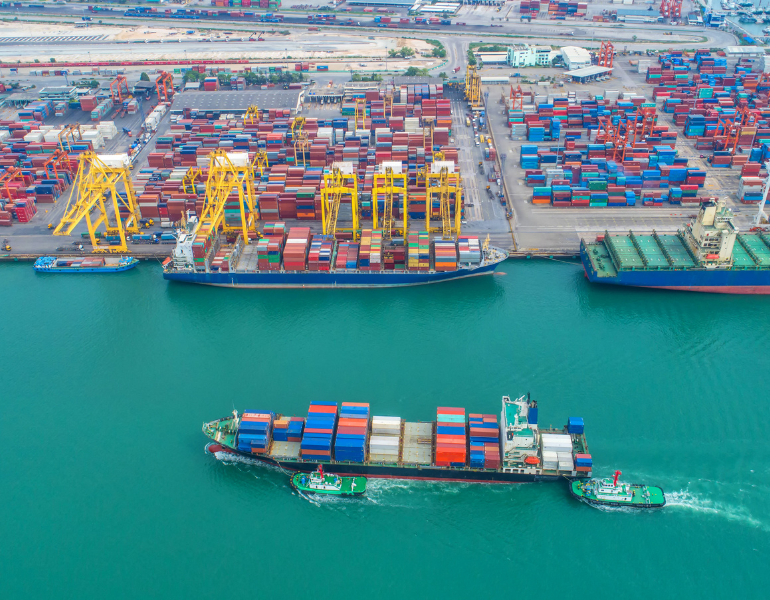Incoterms
Incoterms
1. WHAT ARE INCOTERMS?
Incoterms or International Commercial Terms is an abbreviated term for "International Commercial Terms," given by the International Chamber of Commerce (ICC). This is a set of international rules and regulations used in international sales contracts, to clearly define the responsibilities and risks between the seller and the buyer in transporting goods from the place of origin to the place of receipt. .
Incoterms define delivery requirements, including the rights and obligations of the parties in transporting the goods, costs and liabilities. By using Incoterms, the parties involved in the transaction can avoid misunderstandings and clearly define the responsibilities of each party during the goods delivery process.
There are several different versions of Incoterms and new versions are released at regular intervals to keep up with regulations and changes in international trade. The latest version of Incoterms is Incoterms 2020.
A series of three-letter commercial terms related to common contractual sales practices, the Incoterms rules are primarily intended to clearly communicate the duties, costs and risks involved in transporting goods. transport and distribute goods globally or internationally. Incoterms inform sales contracts that define the respective obligations, costs and risks involved in the transportation of goods from seller to buyer, but they do not themselves enter into contracts, determining the price. payable, currency or credit terms, govern contract law or determine where rights transfer goods.
Incoterms rules are accepted by governments, regulatory bodies and practitioners worldwide to explain the most commonly used terms in international trade. They aim to reduce or completely eliminate uncertainties arising from different interpretations of the rules in different countries. Therefore, they are frequently included in sales contracts worldwide.
Parties involved in domestic and international commerce often use them as a type of shorthand to help understand each other and the exact terms of their business agreements. Some Incoterms apply to any means of transport, while others apply strictly to water transport.
The International Chamber of Commerce (ICC) developed Incoterms in 1936 and periodically updates them to accommodate changing commercial practices. Typical examples of Incoterms rules for any method of transport include Delivered at Terminal (DAT), Delivered Duty Paid (DDP) and Ex Works (EXW). Incoterms have been updated for 2020 and despite only changing one term, there are notable differences in security costs. Terms are standardized but certain buyers and sellers will prefer individual terms over others. As such, which term will be used is a matter of negotiation.

Incoterms play an important role in the Logistics industry
2. INTERNATIONAL TRADE TERMS INCOTERMS
Incoterms 2020 includes 11 delivery conditions, divided into 4 groups: C, D, E, F. In which, group E includes 1 condition (EXW), group F includes 3 conditions (FCA, FAS, FOB) , group C includes 4 conditions (CFR, CIF, CPT, CIP) and group D includes 3 conditions (DPU, DAP, DDP).
1. EXW
Ex Works (named Place)
Delivery at factory (location in exporting country)
- The seller prepares the goods at the factory (factory, warehouse, store...) in accordance with the means of transport to be used.
- Once the buyer has received the goods, the seller has all responsibility.
- The seller transfers to the buyer the commercial invoice and related goods documents.
- The buyer receives the goods at the seller's factory.
- The buyer bears all costs and risks from the time of receipt of the goods at the seller's factory.
- Insurance is not mandatory, but if required, the buyer will buy insurance because they bear the risk.
- The buyer completes and bears the costs of export, transit, and import customs clearance.
- This Incoterm should not be used if the seller delivers the goods anywhere other than his own premises.
2. FCA
Free Carrier (named place)
Delivery of goods to the carrier (at the specified location in the exporting country)
- The seller loads the goods onto the means of transport designated by the buyer.
- The seller carries out procedures and bears all costs related to export licenses and taxes.
- The seller delivers to the buyer invoices, transport documents and related goods documents.
- The seller is responsible for inland transportation and export customs clearance unless the designated location is the seller's facility (FCA warehouse), in which case the goods are delivered there and loaded onto a means of transport by the seller. Purchase arranged at buyer's expense.
- The buyer bears the costs from loading the goods onto the ship until unloading, including insurance if purchased from outside because they bear the risk when the goods are loaded onto the first means of transport.
- The time of transfer of risk is after the seller has delivered the goods to the carrier.
The new change with FCA (Incoterm 2020) compared to Incoterm 2010 is that during the transportation process, the buyer can request their shipping company to issue a bill of lading to the seller designated "on board" as proof of delivery. goods, thus facilitating the use of documentary credit. Credit is granted to the seller by means of a bank guarantee even though he is not party to the contract of carriage.
3. FAS
Free Alongside ship (named port of shipment)
- The seller delivers the goods alongside the vessel (at the named port of loading) and bears the costs until delivery as well as being responsible for export customs formalities.
- Buyer is responsible for loading the goods on board, loading, freight and other costs until delivery at destination, including import customs clearance and insurance, if removed as not required . The buyer also bears the risk when the goods are at the loading dock before being loaded onto the vessel.
- This Incoterm is only valid for transportation and is often used for special goods with specific loading requirements, not often used for goods stacked on pallets or containers.
4. FOB
Free On Board (named port of shipment)
Delivery on board ship (at specified port of loading)
- The seller bears the costs until the goods are loaded on board the vessel, at which point the risk is transferred as well as responsibility for export customs clearance and costs at the place of origin. The seller also arranges shipping although the buyer bears the cost.
- Buyer is responsible for shipping, unloading, import clearance and delivery costs at destination as well as insurance if they take the goods out. The transfer of risk occurs while the goods are on board the ship.
- This Incoterm is used for shipping only. It should not be used for goods in containers because liability is transferred when the goods are loaded onto the ship (the goods are in direct contact with the ship's deck) and the container is not loaded when entering the port, therefore, if the goods If there is any damage inside the container, it will be difficult to determine when the damage occurred.
5. CFR
Cost and Freight (named port of destination)
Cost of goods and freight (specified port of destination)
- The seller is responsible for all costs until the goods arrive at the destination port, including export customs clearance, costs at origin, freight and often unloading costs.
- The buyer is responsible for import procedures and shipping to destination. They are also at risk from the moment the goods are loaded onto the ship, so, although not required, buyers often purchase insurance.
6. CIF
Cost, Insurance and Freight (named port of destination)
Cost of goods, insurance and freight (specified port of destination)
- As with CFR, the seller bears all costs until reaching the destination port, including export customs clearance, costs at origin, freight, and often unloading. However, unlike CFR, the seller must also arrange insurance although the risk is transferred to the buyer once the goods are loaded on board the vessel.
- The buyer bears the costs of import and transportation to destination.
New in the 2020 version of the Incoterm is that the seller must arrange insurance in accordance with what is specified in the Institute of Goods Clause (C). In other words, the goods must be insured until they reach the destination port.
7. CPT
Carriage Paid To (named place of destination)
Freight and insurance paid to (specified destination)
- The seller bears the costs until the goods are delivered to an agreed location, meaning they are responsible for all costs at origin, export customs clearance, primary transportation and often at destination.
- Buyer is responsible for import procedures and insurance if taking out as it is not required. Risk is transferred to the buyer when the goods are loaded onto the first means of transport arranged by the seller.
- This Incoterm is valid for all means of transport.
8. CIP
Carriage & Insurance Paid To (named place of destination)
Freight and insurance paid to (specified destination)
- The seller bears the costs until delivery of the goods at an agreed point at destination, i.e. costs at origin, export customs clearance, freight and also mandatory insurance.
- The buyer is responsible for import customs clearance and delivery at destination and bears the risk when the goods are loaded onto the first means of transport.
The new feature of this Incoterm compared to Incoterms 2010 again concerns the scope of insurance. In this case, in addition to being mandatory, the insurance must have the same coverage as that specified in Cargo Clause (A), the goods must be insured until delivery to the carrier at destination.
9. DPU
Delivered at Place Unloaded (named place of destination)
Delivery at unloading location
- The seller bears the costs and risks arising at the place of origin, packaging, loading, export procedures, transportation of goods, unloading at the place of destination and delivery at the agreed point.
- The buyer is responsible for import customs clearance procedures.
This Incoterm is new and replaces DAT. In fact, it increases the delivery options because DAT states that delivery must take place at the terminal, whereas with new DPU delivery can take place at another agreed location with terminal.
10. DAP
Delivered at Place (named place of destination)
Delivery at destination
- The seller bears all costs and risks of the operation except for import customs clearance and unloading at destination, i.e. all costs at origin, freight and inland transport.
- The buyer is solely responsible for import customs clearance and unloading.
This Incoterm is valid for all means of transport. Insurance is not required but if taken out the seller bears the cost.
11. DDP
Delivered Duty Paid (named place of destination)
Delivery duty paid (at named destination)
- The seller bears all costs and risks from packaging and inspection at their warehouse until delivery at the final destination, including export and import procedures, freight and insurance, if taken out.
- The buyer only has to take delivery of the goods and usually unload them, although this can also be done by the seller.
This Incoterm is completely opposite to EXW, the seller bears all costs and risks.
.png)
Bảng điều khoản Incoterms 2020 chi tiết về địa điểm giao hàng & chuyển giao rủi ro
của người bán & người mua
If you need detailed advice on Logistics services, contact here:
PRESTIGE - QUALITY - PREFERENTIAL PRICE
Or contact hotline immediately: 0211.359.3375 or 0913.866.367
Working hours: Monday - Sunday (8:00 a.m. - 6:00 p.m.)




.png)


